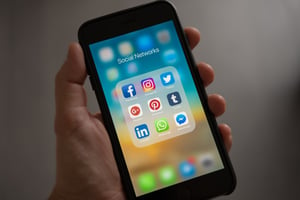3 Post-Interview Mistakes That Can Cost You the Job
-1.jpg)
You just completed an interview, and it went great. Now, just sit back and wait for the offer, right?
You could, but you'd be missing out on a golden opportunity to impress the hiring manager and further ensure your success.
After an interview, the steps you take largely impact a hiring manager's perception of you. How you choose to act can either help you stand out or hurt your chances of advancing in the process.
Taking a thoughtful approach to the post-interview period - knowing the sweet spot for follow-up and the right things to say - can also help you redeem yourself if you fell short during the interview. There are three crucial areas that candidates often miss:
- Sending a Thank You
- Using Social Media
- Following Up
Take the post-interview period seriously and read on to learn about how you can avoid making these three costly mistakes.
1. Thank You Note
There are a handful of missteps that can occur when it comes to sending a post-interview thank you. One of the worst mistakes? Failing to say thank you altogether. It's becoming less common for candidates to show their appreciation after their interview, and for many hiring managers, this is a dealbreaker. Don't skip this simple step.
Make It Timely. Avoid sending the thank you email too early or too late. Aim to send it within 24-to-48 hours after your interview. You've got a small window to get it right. Sending it too soon can make it seem like you drafted the email prior to the interview, were using a generic response, or didn't spend enough time reflecting on your conversation. Waiting too long may make it seem like you're not interested or lack the courtesy to thank them for their time.
Customize It. Your thank you should be tailored to the interview and hiring manager. Thank the interviewer for their time and use the note to reflect on key points from your discussion. Mention something specific from your conversation that demonstrates your listening skills. Provide further insight that shows you've ruminated on the exchange. Your thank you doesn't need to be a novel (in fact, it shouldn't be), but steer clear of a blanket message that could be used for anyone.
If you fumbled your words during the interview and forgot to mention something, or time didn't allow you to elaborate, now's your chance to put it in writing. Say you've given it some additional thought, and you have a few points to share.
Send a customized thank you email to each person you've met or talked to during the interview. While staying attentive, jot down a few notes during your interview to refer back to when writing your thank you.
Handwritten or Email? Handwritten notes via snail mail were once popular - back when it was the only way to thank a hiring manager for their time. They made a comeback in the early 2010s to help a candidate break through the email inbox noise. Although the lost art of handwritten thank yous can go a long way, don't forget that time is of the essence, especially during the hiring process.
The most important thing you can do is to ensure your interviewer receives a timely thank you. Plus, with remote and hybrid work on the rise, you wouldn't want to risk your letter not getting into the hands of the hiring manager. Your best bet is to send a thoughtful email.
2. Social Media
Social media can be a helpful mechanism for growing your network, but using it carelessly can get you into hot water. Avoid connecting with the interviewer on social networking sites before the interview. You've not yet established a relationship with them, so a request to connect can feel forced, even on LinkedIn. As a general rule of thumb, never friend request an interviewer on Facebook at any stage of the hiring process.
You may consider connecting with them on LinkedIn after your interview; the further you get into the interview process, the more familiar you are to the interviewer, and the lower your risk is of seeming intrusive. Our suggestion is to avoid connecting on social media with the interviewer at any stage of the hiring game, including LinkedIn. It may put a hiring manager - who has yet to make a decision - in an uncomfortable position.
 If your profiles are public, ensure they are appropriate. Know that hiring managers and team members are searching for you on social media. According to a 2018 CareerBuilder Survey, 70% of employers use social media to screen candidates during the interview process. If need be, play it safe and put your profiles on private.
If your profiles are public, ensure they are appropriate. Know that hiring managers and team members are searching for you on social media. According to a 2018 CareerBuilder Survey, 70% of employers use social media to screen candidates during the interview process. If need be, play it safe and put your profiles on private.
Lastly, if you had a negative experience, avoid posting a heated reactionary review on job sites, like Glassdoor, even if your response is anonymous. Based on context clues, hiring managers may be able to pinpoint that the response is yours. Instead, be thoughtful yet truthful in your response, if you feel inclined to leave a review. Keep in mind that you never know what the future holds or whose path you may cross. When it comes to social media, tread sensibly.
3. The Follow-Up
-2.jpg?width=300&name=image%20(3)-2.jpg)
So you had an initial phone call with a recruiter, made it through an interview, sent your thank you note, and then ââ¬Â¦ silence. It's not uncommon to feel like you've been ghosted after an interview while hiring managers continue conducting interviews. Striking with a follow-up email can be a powerful way to show the hiring manager that you're still interested. Conversely, failing to follow up within a reasonable timeframe may give the impression you don't care much about the role.
The same concept as with the thank you note applies here - timing is crucial. Avoid seeming too eager; following up 2-3 days after your last contact may not be viewed favorably. Instead, save the first follow-up for 7-9 days after your interview to reconnect and ask for an update on the hiring process.
When the nerves have settled down after an interview, don't think you're off the hook. How you handle the post-interview period will influence a hiring manager's perception of you. This timeframe speaks volumes about you personally and professionally.